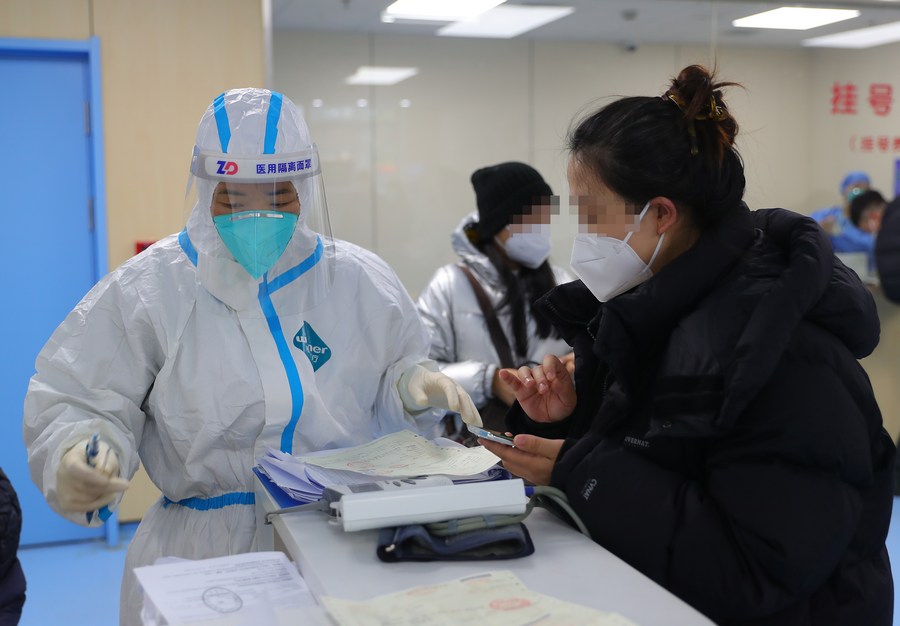Hospitals gear up to handle fever patient surge

A medical worker works at a fever clinic at Shengjing Hospital of China Medical University in Shenyang, northeast China's Liaoning Province, Dec. 15, 2022. (Xinhua/Yang Qing)
BEIJING, Dec. 19 (Xinhua) -- Medical institutions and health authorities across China are exerting maximum effort to expand the capacity of fever clinics to cope with a surge in patients due to COVID-19 infections.
The sudden spike in new infections recently has placed enormous strain on medical resources. Amid the shift of focus in the country's COVID response strategy from infection prevention to case treatment, China is accelerating efforts to establish more fever clinics.
A makeshift fever clinic built in a stadium in Beijing's Xicheng District has been put into service, in response to rising demand for timely medical services.
The makeshift clinic, staffed by medics from several public hospitals in the district, has four consulting rooms and is equipped with temporary pharmacies and sufficient medicine storage. Fever patients can have quick consulting service from a doctor and get the medicine.
The total number of fever clinics in Beijing has rapidly risen from 94 to 1,263, including those opened at 960 community healthcare institutions, Tu Zhitao, director of the Beijing municipal administration of Traditional Chinese Medicine, told a press conference on Monday.
During winter, due to the overlapping effects of seasonal flu, patients with lung diseases and cardiovascular and cerebrovascular diseases become more vulnerable and require more medical care, bringing medical institutions under great strain.
In Harbin, capital of northeastern Heilongjiang Province, local hospitals have increased their fever clinics and emergency rooms, and created special clinics for COVID-19 patients who need care for other medical concerns.
The First Affiliated Hospital of Harbin Medical University has expanded the number of its fever clinics to three. At the same time, medical staff in the hospital have received training on infection control, self-care, and other topics.
The hospital's emergency department has seen an 85-percent increase in patient visits in recent days, said Yu Kaijiang, president of the hospital, adding that more emergency rooms will be put into use depending on the actual needs.
In Xi'an, Shaanxi Province, patients with COVID-19 and related symptoms can find a 24-hour access to medical care, both on-site and online.
Fever clinics are open around the clock at the Second Affiliated Hospital of Xi'an Jiaotong University, which also provides online consultation for COVID and flu, home delivery of medicine, and other services to reduce patients' waiting time, and reduce the risk of cross-infection.
Moreover, pregnant women, and patients with blood diseases, or other serious illnesses can receive timely treatment at the hospital as its obstetrics and gynecology department, infection department, and emergency hemodialysis are open 24 hours a day.
Hospitals in Shanghai have streamlined the procedures for diagnosing and treating children with symptoms of COVID-19. Underage patients can complete antigen, nucleic acid tests, and routine blood tests at the fever clinic of Children's Hospital of Fudan University, which has largely saved the time of seeing a doctor.
In Suzhou, eastern Jiangsu Province, obsolete nucleic acid testing booths have been repurposed into fever treatment stations. Thanks to these temporary clinics, it takes just around 10 minutes for a patient with fever to see a doctor and obtain medicines.
There are 1,035 such clinics in the city at present, capable of receiving more than 80,000 patients per day.
As the first line of defense for public health, primary healthcare institutions are playing an active role in making medical services more accessible and convenient, according to Nie Chunlei, an official with the National Health Commission.
It is expected that by March 2023, about 90 percent of township-level health centers will be equipped with fever clinics, Nie added.
Photos
Related Stories
- More elderly get COVID vaccine jabs
- Virus experts expect normalcy by spring
- Commentary: Adjustment of China's COVID measures a boon to economic recovery
- China steps up protecting vulnerable groups amid COVID-19 response optimization
- Commentary: Lives protected to utmost in China's three-year battle against COVID-19
Copyright © 2022 People's Daily Online. All Rights Reserved.









